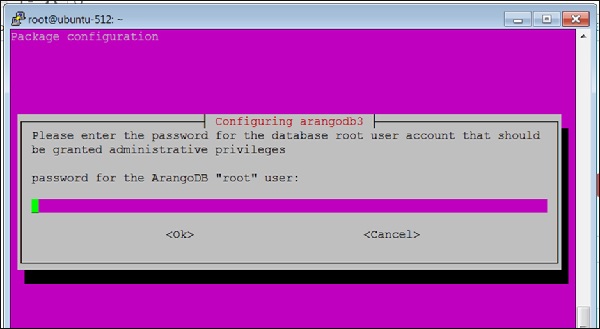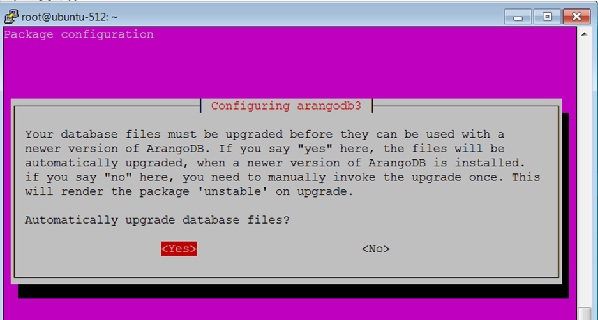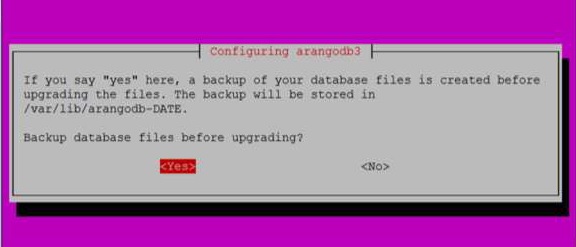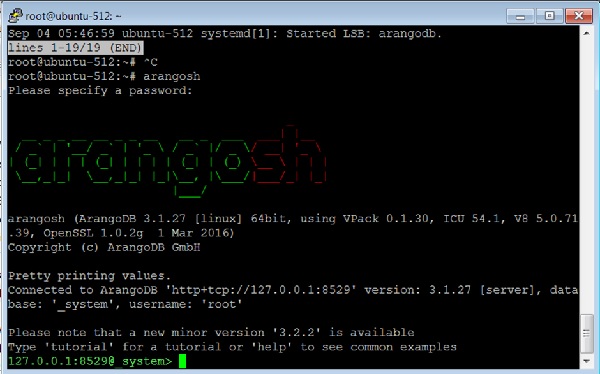
- ArangoDB Tutorial
- ArangoDB - Home
- A Multi-Model First Database
- ArangoDB – Advantages
- Basic Concepts & Terminologies
- ArangoDB – System Requirements
- ArangoDB – Command Line
- ArangoDB - Web Interface
- ArangoDB - Example Case Scenarios
- Data Models & Modeling
- ArangoDB - Database Methods
- ArangoDB - Crud Operations
- Crud Operations Using Web Interface
- Querying The Data With AQL
- ArangoDB - AQL Example Queries
- ArangoDB – How To Deploy
- ArangoDB Useful Resources
- ArangoDB - Quick Guide
- ArangoDB - Useful Resources
- ArangoDB - Discussion
ArangoDB - System Requirements
In this chapter, we will discuss the system requirements for ArangoDB.
The system requirements for ArangoDB are as follows −
- A VPS Server with Ubuntu Installation
- RAM: 1 GB; CPU : 2.2 GHz
For all the commands in this tutorial, we have used an instance of Ubuntu 16.04 (xenial) of RAM 1GB with one cpu having a processing power 2.2 GHz. And all the arangosh commands in this tutorial were tested for the ArangoDB version 3.1.27.
How to Install ArangoDB?
In this section, we will see how to install ArangoDB. ArangoDB comes pre-built for many operating systems and distributions. For more details, please refer to the ArangoDB documentation. As already mentioned, for this tutorial we will use Ubuntu 16.04x64.
The first step is to download the public key for its repositories −
# wget https://www.arangodb.com/repositories/arangodb31/ xUbuntu_16.04/Release.key
Output
--2017-09-03 12:13:24-- https://www.arangodb.com/repositories/arangodb31/xUbuntu_16.04/Release.key Resolving https://www.arangodb.com/ (www.arangodb.com)... 104.25.1 64.21, 104.25.165.21, 2400:cb00:2048:1::6819:a415, ... Connecting to https://www.arangodb.com/ (www.arangodb.com)|104.25. 164.21|:443... connected. HTTP request sent, awaiting response... 200 OK Length: 3924 (3.8K) [application/pgpkeys] Saving to: ‘Release.key’ Release.key 100%[===================>] 3.83K - .-KB/s in 0.001s 2017-09-03 12:13:25 (2.61 MB/s) - ‘Release.key’ saved [39 24/3924]
The important point is that you should see the Release.key saved at the end of the output.
Let us install the saved key using the following line of code −
# sudo apt-key add Release.key
Output
OK
Run the following commands to add the apt repository and update the index −
# sudo apt-add-repository 'deb https://www.arangodb.com/repositories/arangodb31/xUbuntu_16.04/ /' # sudo apt-get update
As a final step, we can install ArangoDB −
# sudo apt-get install arangodb3
Output
Reading package lists... Done Building dependency tree Reading state information... Done The following package was automatically installed and is no longer required: grub-pc-bin Use 'sudo apt autoremove' to remove it. The following NEW packages will be installed: arangodb3 0 upgraded, 1 newly installed, 0 to remove and 17 not upgraded. Need to get 55.6 MB of archives. After this operation, 343 MB of additional disk space will be used.
Press Enter. Now the process of installing ArangoDB will start −
Get:1 https://www.arangodb.com/repositories/arangodb31/xUbuntu_16.04 arangodb3 3.1.27 [55.6 MB] Fetched 55.6 MB in 59s (942 kB/s) Preconfiguring packages ... Selecting previously unselected package arangodb3. (Reading database ... 54209 files and directories currently installed.) Preparing to unpack .../arangodb3_3.1.27_amd64.deb ... Unpacking arangodb3 (3.1.27) ... Processing triggers for systemd (229-4ubuntu19) ... Processing triggers for ureadahead (0.100.0-19) ... Processing triggers for man-db (2.7.5-1) ... Setting up arangodb3 (3.1.27) ... Database files are up-to-date.
When the installation of ArangoDB is about to complete, the following screen appears −

Here, you will be asked to provide a password for the ArangoDB root user. Note it down carefully.
Select the yes option when the following dialog box appears −

When you click Yes as in the above dialog box, the following dialog box appears. Click Yes here.

You can also check the status of ArangoDB with the following command −
# sudo systemctl status arangodb3
Output
arangodb3.service - LSB: arangodb
Loaded: loaded (/etc/init.d/arangodb3; bad; vendor pre set: enabled)
Active: active (running) since Mon 2017-09-04 05:42:35 UTC;
4min 46s ago
Docs: man:systemd-sysv-generator(8)
Process: 2642 ExecStart=/etc/init.d/arangodb3 start (code = exited,
status = 0/SUC
Tasks: 22
Memory: 158.6M
CPU: 3.117s
CGroup: /system.slice/arangodb3.service
├─2689 /usr/sbin/arangod --uid arangodb
--gid arangodb --pid-file /va
└─2690 /usr/sbin/arangod --uid arangodb
--gid arangodb --pid-file /va
Sep 04 05:42:33 ubuntu-512 systemd[1]: Starting LSB: arangodb...
Sep 04 05:42:33 ubuntu-512 arangodb3[2642]: * Starting arango database server a
Sep 04 05:42:35 ubuntu-512 arangodb3[2642]: {startup} starting up in daemon mode
Sep 04 05:42:35 ubuntu-512 arangodb3[2642]: changed working directory for child
Sep 04 05:42:35 ubuntu-512 arangodb3[2642]: ...done.
Sep 04 05:42:35 ubuntu-512 systemd[1]: StartedLSB: arang odb.
Sep 04 05:46:59 ubuntu-512 systemd[1]: Started LSB: arangodb. lines 1-19/19 (END)
ArangoDB is now ready to be used.
To invoke the arangosh terminal, type the following command in the terminal −
# arangosh
Output
Please specify a password:
Supply the root password created at the time of installation −
_ __ _ _ __ __ _ _ __ __ _ ___ | | / | '__/ _ | ’ \ / ` |/ _ / | ’ | (| | | | (| | | | | (| | () _ \ | | | _,|| _,|| ||_, |_/|/| || |__/
arangosh (ArangoDB 3.1.27 [linux] 64bit, using VPack 0.1.30, ICU 54.1, V8 5.0.71.39, OpenSSL 1.0.2g 1 Mar 2016) Copyright (c) ArangoDB GmbH Pretty printing values. Connected to ArangoDB 'http+tcp://127.0.0.1:8529' version: 3.1.27 [server], database: '_system', username: 'root' Please note that a new minor version '3.2.2' is available Type 'tutorial' for a tutorial or 'help' to see common examples 127.0.0.1:8529@_system> exit

To log out from ArangoDB, type the following command −
127.0.0.1:8529@_system> exit
Output
Uf wiederluege! Na shledanou! Auf Wiedersehen! Bye Bye! Adiau! ¡Hasta luego! Εις το επανιδείν! להתראות ! Arrivederci! Tot ziens! Adjö! Au revoir! さようなら До свидания! Até Breve! !خداحافظ